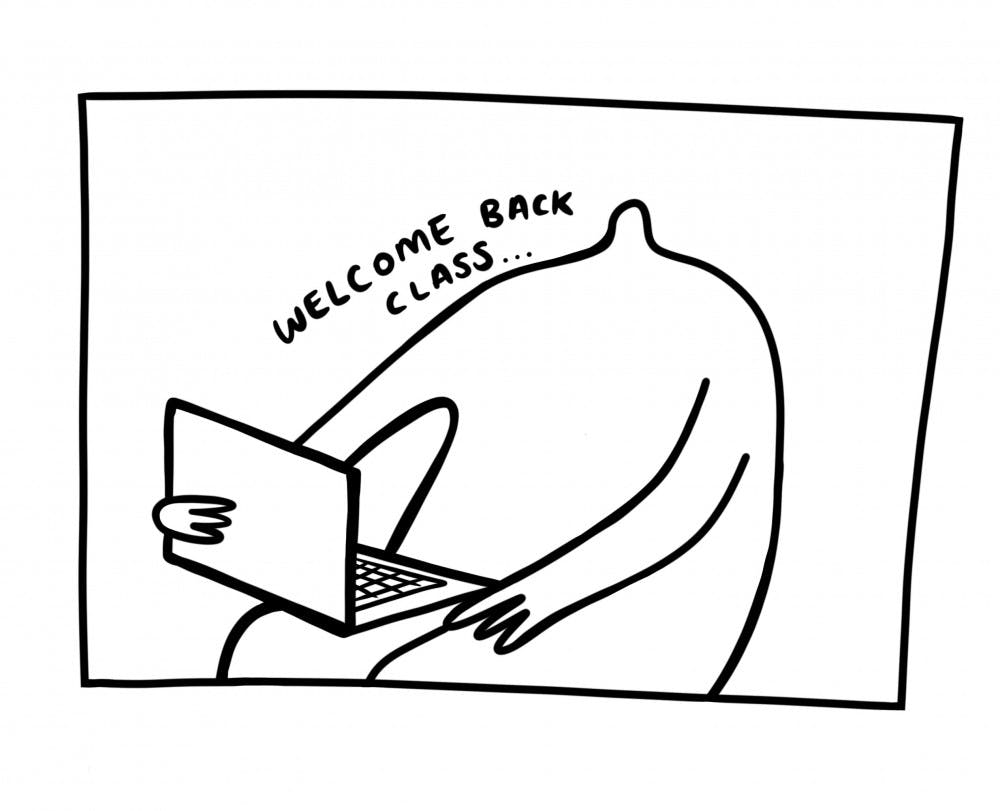Assistant Professor of Economics Andrew Fieldhouse woke up on Sept. 21, with congestion and a slight cough. He sent out an email to his class, moving the Tuesday discussion section online.
“Syllabus policy is that anyone with any cold-like symptoms shouldn’t come to class, myself included,” he said.
As most courses resume in-person instruction, cold-like symptoms, possible exposures and caution have pushed some professors to temporarily hold classes online while they quarantine.
“I think it was pretty easy to move online. I mean, it’s definitely not the most ideal environment for a discussion, but it was easy,” said Clara Geci ’22, a student in Fieldhouse’s Macroeconomics of Depressions course.
Geci had not been in a class with Fieldhouse since the week before, and she knew that a number of students with back-to-school colds had tested negative.
After Ajay Verghese, assistant professor of political science, was infected with the Covid-19 virus, he made the call to switch to recorded lectures for his comparative politics course for the remainder of the year.
Agnes Roche ’24.5, a student in Verghese’s comparative politics course, said that on the first Zoom call, Verghese informed his class of the switch to recorded lectures.
“I got the sense that he just got freaked out from his experience, and realized that it’s pretty serious getting it, even after you’ve been vaccinated, so that’s why he switched back to online,” she said.
Verghese had been staying with his parents in Pennsylvania, when his 22-month-old daughter contracted Covid-19 in daycare. Even though Verghese, his wife and his parents had all received the Covid-19 vaccine, they all contracted breakthrough cases of the virus.
“You can’t really socially distance from a two year old,” he said.
Verghese was technically out of the quarantine period before classes had begun, but he wanted to obtain a PCR test to be safe before returning to in-person teaching. He started his classes online, and was ultimately back in the classroom the second week of classes.
Verghese also remains apprehensive since his daughter has returned to daycare in Vermont, and he worries about another outbreak.
“Right after I got a breakthrough infection, just walking up the stairs was exhausting, and I remember thinking, how am I gonna teach if I still have these symptoms?” he said.
Verghese questioned how older faculty would be able to teach if they had a breakthrough infection. He never got very sick, he said, but he still has a residual cough.
Last year, the college ran on-campus testing for faculty who were teaching in person, but this year, professors are expected to obtain testing locally. Symptomatic students can get tested through Parton health services, and the college offers a limited number of tests for asymptomatic students on Mondays.
When Fieldhouse fell ill, he called his primary care physician, who then called in a test at Porter hospital. Porter did not call back for a day, and Fieldhouse ultimately received a test at the last minute when another patient canceled their visit. Getting tested while asymptomatic at local centers was easier, Fieldhouse said.
According to Fieldhouse, Porter hospital is overwhelmed with the rise in Delta variant cases.
“It’s unfortunate that there’s not an availability for faculty and staff to get tested through Middlebury if they’re symptomatic, and it’s harder to get tested,” he said.
On Thursday, Fieldhouse received a negative PCR result and moved his discussion section back to in-person with less than a half hour’s notice.
“In some respects, this is a huge silver lining to the pandemic,” Fieldhouse said. “If I was feeling really sick before, I just wouldn’t come to class, whereas being able to just abruptly move to remote modality for just one day, it’s pretty convenient.”
Even though this semester offers more in-person classes and opportunities, students and professors are expected to remain flexible. Fieldhouse expects that there may be times in the semester in which many students are awaiting test results, and an online option will be necessary.
“We’ll make that work,” he said.

Katie Futterman '24 (she/her) is a Managing Editor.
Katie previously served as a News Editor and Staff Writer. This past summer, she was a news intern at Seven Days, and she held the same position at the Addison Independent the prior summer. In her free time, she loves to read, write, and bask in the sun.




